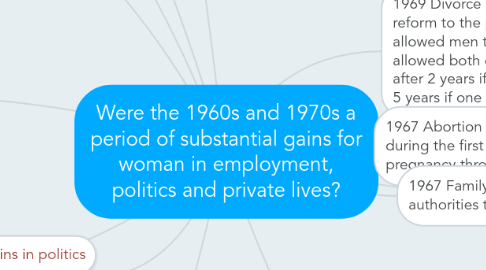Were the 1960s and 1970s a period of substantial gains for woman in employment, politics and private lives?
by christine chikura


1. Employment brought many acts that actually enabled woman to enter a workplace fairly without the fear of low payment or the fear of being treated unfairly, however like private lives these legislations helped bring about substantial gains but it didn't mean that woman in work necessarily experienced them. Some loopholes still meant that mean were paid more and employer discriminated the hire of woman. Despite all this considering woman's positions before the 60s and 70s it would be fair to say the received substantial gains in employment.
2. In politics woman's role was very limited even in the 60s and 70s and issues that actually affected woman were disregarded by woman politicians, despite all this there were some tremendous gains in politics the first woman prime minister and Barbara castle as the first woman secretary state, are non arguably substantial gains.
3. The majority of woman did not return to work until after 10 years of having a child
4. Arguments for gains in employment
5. 1951 1/4 woman worked in 1961 1/3 showing a substantial change. There was an increase in semi skilled work.
6. 1970 Equal Pay Act
7. 1978- Married working woman began to pay national insurance
8. 1975 Employment Protective Act - Couldn't be fired for being pregnant + 6 weeks maternity pay after 2 years if work.
9. 1975- First Female news anchor Angela Rippon
10. Arguments against gains in employment.
11. The equal pay act had loop holes many employers argued that woman's wages were lower due to them doing a lower type of work
12. Marriage was seen a life goal for woman
13. There were a lack of nurseries till 1990
14. Woman in TV shows in the 70s were presented as damsels and fragile objects of male desire.
15. Arguments for gains in Politics
16. 1968 - Ford machinists' strike, Dagenham1968 - Ford machinists' strike, Dagenham
17. 1969 - Bernadette Devlin becomes youngest MP
18. 1968 - Barbara Castle becomes First Secretary of State
19. 1979 - Margaret Thatcher becomes first woman Prime Minister
20. Arguments against gains in politics
21. Female issues were never in the agenda of parliament due to there being a lack of woman in parliament
22. Females were more determined to be seen as well rounded politicians rather than woman's rights advocates .
23. 1964- Government contained 7 of the 18 female MP's
24. It is accurate to say that in the period 1960 to 1970 woman achieved substantial gains in their personal lives Womans position prior to the 60s and the 70s were very limited and this period brought about many legislations that had a large impact. However these changes did not mean that the opinion of society necessarily changed.
24.1. New node
24.1.1. New node
24.1.1.1. New node
24.1.1.1.1. New node
